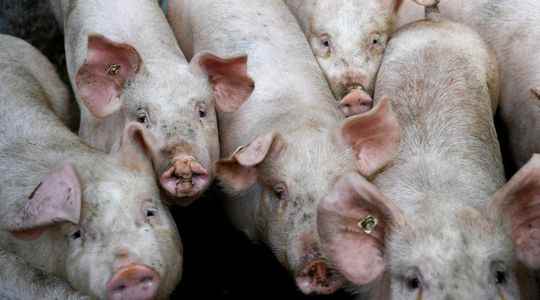Bad times for breeders. While avian flu has already led to the slaughter of more than ten million French poultry, African swine fever (ASF) threatens French farms. The outbreaks are multiplying in the world and in particular in certain European countries bordering France, such as Italy or Germany, which declared its first cases in 2020.
If it is not transmitted to humans, the animal epidemic could have disastrous consequences on the economy and foodstuffs, already victims of inflation and shortagescaused by various factors, including the war in Ukraine and Covid-19.
- A home near the French border in Germany
The threat of African swine fever is approaching French territory. An outbreak has been detected in a farm in Germany, six kilometers from the French border, announced the French Ministry of Agriculture on Thursday May 26.
In this farm which is located in Forchheim am Kaiserstuhl, less than 40 kilometers from Colmar, the 35 pigs which were raised in the open air were killed and “no case has been identified at this stage within the wild fauna in surrounding area,” the ministry said. It is the “first case highlighted on the western border of Germany (…) on the other side of the Rhine”, specifies the ministry.
In conjunction with the European Commission, a protection and surveillance zone has been set up by the German authorities, who will “intensify the search for wild boar carcasses and control the surrounding farms”. The Ministry of Agriculture will launch a crisis unit “next week” with “all professionals and state services”.
- 38 countries and 5 continents affected
African swine fever is also circulating in wildlife in Italy, less than 100 km from the border with France, where an emergency plan to stem the virus in the region of Rome, which has eight cases since the start of the year, was launched.
In total, since January 2020, cases have been reported in 38 countries on five continents, with more than 1.1 million cases listed in domestic pigs and more than 34,000 among wild boars, according to the World Health Organization. animal health (OIE).
- A virus that cannot be transmitted to humans
African swine fever kills pigs, wild boars and warthogs within ten days of infection, according to the European Food Safety Authority, and has no treatment or vaccine. On the scale of an affected farm, all the pigs are slaughtered. Conspecifics from neighboring farms are usually also to avoid the spread.
The virus is not transmitted from human to human, but from one animal to another by the consumption of infected food – for example if domestic pigs are fed with leftovers – or by contact with any contaminated support (boots, wheels vehicle).
High fever, loss of appetite, skin lesions are some of the symptoms. There is no vaccine or treatment. Up to 100% mortality can be observed. The virus is present in all bodily fluids and very resistant. It can survive for more than two months in meat and sausages from affected animals.
- Economic consequences
The economic consequences linked to the virus can be heavy for breeders. “Its introduction in France could have serious socio-economic and health consequences for the professional sectors concerned”, thus warns the Ministry of Agriculture. The pig market has been very disrupted since Germany declared its first cases in wild boars in September 2020. At the national level, the country loses its free status, which implies a limitation or even a ban on exports outside the country. European Union not only live pigs but also pigmeat products.
States generally negotiate “regionalization” agreements, so that their free regions can continue to export. France for its part signed an agreement with China in December, allowing it to continue to export pork to this major customer, even if a case of African swine fever occurred on the territory. China, the world’s leading producer, consumer and importer of this meat, is a big market for France. In 2020, the country absorbed almost a third of French exports.
The OIE calls the virus a “global threat”. Especially since over the past six months, ASF has continued “to spread in several regions, reaching new territories, with serious consequences on pig production systems, animal health and welfare, as well as on livelihoods, national food security and international trade”.
